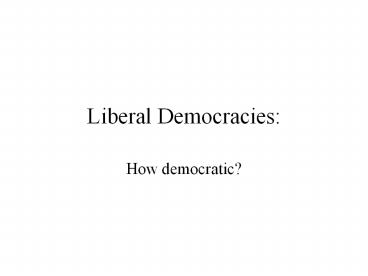Liberal Democracies: - PowerPoint PPT Presentation
Title:
Liberal Democracies:
Description:
Election of 2002. Some cures? Referenda, but utility limited by ... Day-to-day democratic control limited in most liberal democracies, but, free and ... – PowerPoint PPT presentation
Number of Views:126
Avg rating:3.0/5.0
Title: Liberal Democracies:
1
Liberal Democracies
- How democratic?
2
The question
- To what extent are liberal democracies really
democratic? - Subject to popular control?
- Responsive to their citizens?
- Are they different from authoritarian systems?
- If so, how?
3
The problem (1)
- Liberal democracy is defined as government of
the people, by the people, and for the people,
but - In most liberal democracies, the people are not
in direct control - Instead, most governing is done by the few
- Legislators who exercise minimal control over
ministers - Ministers who exercise minimal control over
bureaucrats - Bureaucrats who take more of the decisions
4
The problem (2)
- In addition
- Those who govern are
- put there by political parties, themselves
oligarchical - Surrounded by interest groups
- Which press the demands of those they represent,
rather than the public as a whole - Public not necessarily interested or attentive
5
Assessing democracy
- How responsive is the system?
- Do legislators, members of the political
executive and bureaucrats respond to public
demands? - If so..
- What kinds?
- Under what circumstances?
- How effective is the electoral process?
- Does the public have the last say over
- The content public policy?
- Who actually governs?
6
Degree of democratic control depends on
- Political parties the alternatives they pose
- The electoral system and the extent to which it
facilitates decisive outcomes. - Is it possible to throw the bums out in
- Two party systems?
- Multiparty systems?
- Is there a tradeoff between decisiveness and
representation?
7
Some contrasts
- Does electorate have the last say in either
- Adversarial democracies?
- UK
- Canada
- France
- Consensus-seeking democracies?
- Germany
- Netherlands
- Election of 2002
8
Some cures?
- Referenda, but utility limited by
- Extent of public interest and information
- Possible use and manipulation by interest groups
the case in Switzerland - More frequent electionsbut can result in
- Greater dependency on political money
- Insufficient time to make decisions
- More openness
- Secret v. open government
- The Swedish experience
9
Bottom line
- Day-to-day democratic control limited in most
liberal democracies, but, free and fair elections
- Gives the electorate last say if they care to
exercise it - Forces governments to be (or at least pretend to
be) responsive to the public at large, as well as
demands of interest groups - Openness helps forces decisions to be justified
- Authoritarian regimes can also be responsive
- but typically only to a narrower segment of the
population -- those who put the regime in power
and sustain it.
10
Conclusion
- Liberal democracy is the worst form of
government, except for all the others that have
been tried (Churchill)































